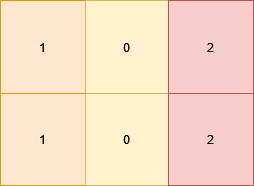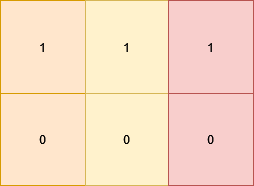| comments | difficulty | edit_url | rating | source | tags | |||
|---|---|---|---|---|---|---|---|---|
true |
Medium |
1904 |
Weekly Contest 394 Q3 |
|
You are given a 2D matrix grid of size m x n. In one operation, you can change the value of any cell to any non-negative number. You need to perform some operations such that each cell grid[i][j] is:
- Equal to the cell below it, i.e.
grid[i][j] == grid[i + 1][j](if it exists). - Different from the cell to its right, i.e.
grid[i][j] != grid[i][j + 1](if it exists).
Return the minimum number of operations needed.
Example 1:
Input: grid = [[1,0,2],[1,0,2]]
Output: 0
Explanation:
All the cells in the matrix already satisfy the properties.
Example 2:
Input: grid = [[1,1,1],[0,0,0]]
Output: 3
Explanation:
The matrix becomes [[1,0,1],[1,0,1]] which satisfies the properties, by doing these 3 operations:
- Change
grid[1][0]to 1. - Change
grid[0][1]to 0. - Change
grid[1][2]to 1.
Example 3:
Input: grid = [[1],[2],[3]]
Output: 2
Explanation:
There is a single column. We can change the value to 1 in each cell using 2 operations.
Constraints:
1 <= n, m <= 10000 <= grid[i][j] <= 9
We notice that the values in the cells of the matrix only have 10 possibilities. The problem requires us to find the minimum number of operations for each column to have the same number, and the numbers in adjacent columns are different. Therefore, we only need to consider the case of modifying the number to 0 to 9.
We define the state
Where
Finally, we only need to find the minimum value of
The time complexity is
class Solution:
def minimumOperations(self, grid: List[List[int]]) -> int:
m, n = len(grid), len(grid[0])
f = [[inf] * 10 for _ in range(n)]
for i in range(n):
cnt = [0] * 10
for j in range(m):
cnt[grid[j][i]] += 1
if i == 0:
for j in range(10):
f[i][j] = m - cnt[j]
else:
for j in range(10):
for k in range(10):
if k != j:
f[i][j] = min(f[i][j], f[i - 1][k] + m - cnt[j])
return min(f[-1])class Solution {
public int minimumOperations(int[][] grid) {
int m = grid.length, n = grid[0].length;
int[][] f = new int[n][10];
final int inf = 1 << 29;
for (var g : f) {
Arrays.fill(g, inf);
}
for (int i = 0; i < n; ++i) {
int[] cnt = new int[10];
for (int j = 0; j < m; ++j) {
++cnt[grid[j][i]];
}
if (i == 0) {
for (int j = 0; j < 10; ++j) {
f[i][j] = m - cnt[j];
}
} else {
for (int j = 0; j < 10; ++j) {
for (int k = 0; k < 10; ++k) {
if (k != j) {
f[i][j] = Math.min(f[i][j], f[i - 1][k] + m - cnt[j]);
}
}
}
}
}
int ans = inf;
for (int j = 0; j < 10; ++j) {
ans = Math.min(ans, f[n - 1][j]);
}
return ans;
}
}class Solution {
public:
int minimumOperations(vector<vector<int>>& grid) {
int m = grid.size(), n = grid[0].size();
int f[n][10];
memset(f, 0x3f, sizeof(f));
for (int i = 0; i < n; ++i) {
int cnt[10]{};
for (int j = 0; j < m; ++j) {
++cnt[grid[j][i]];
}
if (i == 0) {
for (int j = 0; j < 10; ++j) {
f[i][j] = m - cnt[j];
}
} else {
for (int j = 0; j < 10; ++j) {
for (int k = 0; k < 10; ++k) {
if (k != j) {
f[i][j] = min(f[i][j], f[i - 1][k] + m - cnt[j]);
}
}
}
}
}
return *min_element(f[n - 1], f[n - 1] + 10);
}
};func minimumOperations(grid [][]int) int {
m, n := len(grid), len(grid[0])
f := make([][]int, n)
for i := range f {
f[i] = make([]int, 10)
for j := range f[i] {
f[i][j] = 1 << 29
}
}
for i := 0; i < n; i++ {
cnt := [10]int{}
for j := 0; j < m; j++ {
cnt[grid[j][i]]++
}
if i == 0 {
for j := 0; j < 10; j++ {
f[i][j] = m - cnt[j]
}
} else {
for j := 0; j < 10; j++ {
for k := 0; k < 10; k++ {
if j != k {
f[i][j] = min(f[i][j], f[i-1][k]+m-cnt[j])
}
}
}
}
}
return slices.Min(f[n-1])
}function minimumOperations(grid: number[][]): number {
const m = grid.length;
const n = grid[0].length;
const f: number[][] = Array.from({ length: n }, () =>
Array.from({ length: 10 }, () => Infinity),
);
for (let i = 0; i < n; ++i) {
const cnt: number[] = Array(10).fill(0);
for (let j = 0; j < m; ++j) {
cnt[grid[j][i]]++;
}
if (i === 0) {
for (let j = 0; j < 10; ++j) {
f[i][j] = m - cnt[j];
}
} else {
for (let j = 0; j < 10; ++j) {
for (let k = 0; k < 10; ++k) {
if (j !== k) {
f[i][j] = Math.min(f[i][j], f[i - 1][k] + m - cnt[j]);
}
}
}
}
}
return Math.min(...f[n - 1]);
}

